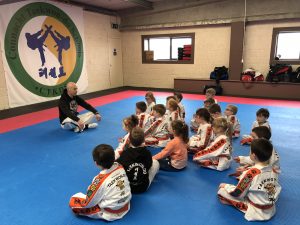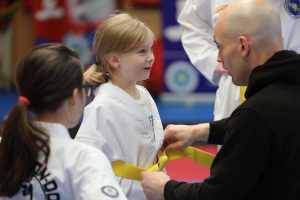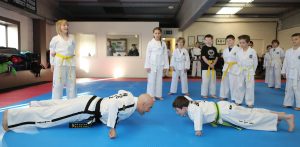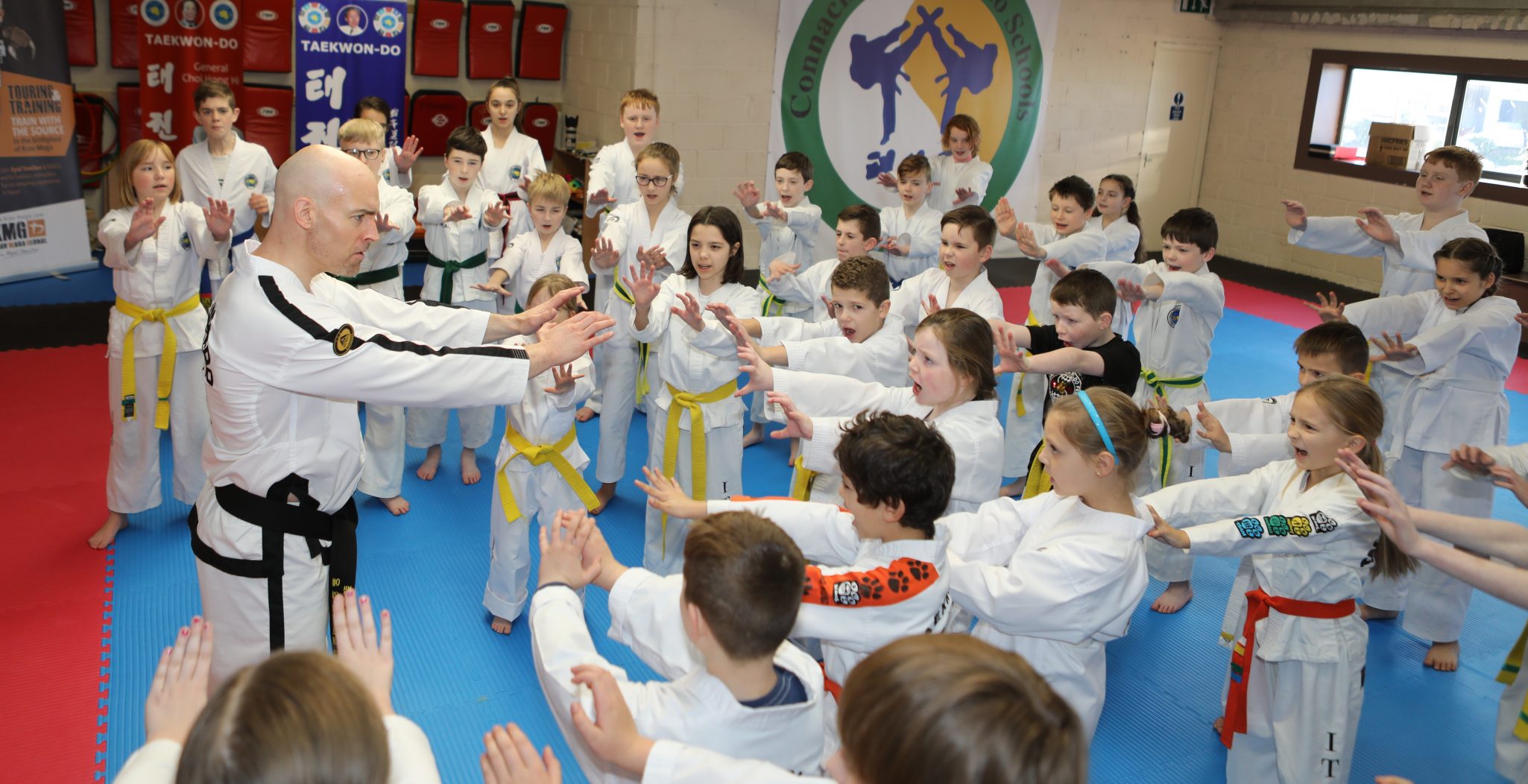Introduction
There is an old saying that one should have one’s own house in order before commenting on another. So, I invest my time in managing my own affairs as best as I can – continuing my own development and that of my Taekwon-Do students. That being said, there comes a point when everyone must stand up and speak out when a pinnacle is reached. Last year, I attended a tournament which was notable, to me, not for the Masters present, but for the Masters and instructors that were ABSENT. The tournament, in my opinion, was clearly being boycotted by senior grades who should have been there. Since that moment I have been mulling over my 30 odd years of experiencing the behaviour and attitudes of Instructors, Masters, & Grandmasters.
This article will discuss what the standards of a Sahyun/Master could or should be, and how easy it is to fall short. Meeting high standards is a challenge Taekwon-Do Masters MUST strive to meet, lest we fail to continually deserve the belt we wear. This article is NOT intended to disparage anyone, but merely share my thoughts on where we senior instructors could improve. Hopefully, it will also serve as food for thought for instructors who aim to reach VII dan someday.
Master or Sahyun?
Let’s start with defining the term, Sahyun. Dr. Sanko Lewis, in his essay, titled “Instructor, Master, Grandmaster: An Explanation of the Terms Used in ITF Taekwon-Do,” and which appeared in Totally TKD Issue 16, describes Sahyun as follows:
“At master’s level (7th-8th Dan) in ITF Taekwon-Do the term sahyeon is used. Again, “sa-” means teacher. The syllable “-hyeon” / –현 / 賢 is related to virtue, wisdom, prudence, or good sense. A wise mother, for instance, is called “hyeonmo.” The implication is that the Taekwon-Do master is not merely a technical teacher, but also a teacher of morality or virtue. Hyeon can also mean “the present” / 現. Understood philosophically, the Taekwon-Do master is a teacher of the moment. This might suggest a Zen understanding where the master teaches their practitioners to “be in the moment” or to bring the principles taught in Taekwon-Do into their everyday lives. While a sabeom could literally mean coach and be restricted to mere physical training, the sahyeon is definitely more than a coach. The sahyeon—master—nurtures both the body and mind of his or her students.”
Dr. Lewis goes on to write:
“General Choi Hong-Hi created these terms and included them into the ITF system to indicate that Taekwon-Do is not merely a combat sport and Taekwon-Do teachers are not merely sport coaches. The terms “sahyeon” (moral-teacher) and “saseong” (sage-teacher) suggest that Taekwon-Do is an ascetic activity; an activity that ought to lead to moral and intellectual improvement. The idea that Taekwon-Do is a means towards character development places a great responsibility on Taekwon-Do teachers. Hopefully instructors, masters, and grandmasters will live up to the implied responsibility imbedded in their titles.”
So, as can be seen, the translation of Sahyun (as it is often spelled), encapsulates a lot more than just the word Master. A true Master, or Sahyun must teach not only physical skill, but also educate on Moral Culture which is the backbone of Taekwon-Do. Without the “Do”, i.e. Moral Culture, we are just teaching Taekwon, i.e. kicking and punching. But what is Moral Culture, and is this term even broad enough?
Moral Culture or Spiritual Discipline?
General Choi left the five Tenets of Taekwon-Do: Courtesy, Integrity, Perseverance, Self-Control, & Indomitable Spirit, as keystones for what he called Moral Culture. But how much is lost in translation?
Dr. John Johnson, PhD, in his article “ITF Moral Culture: It’s Not What You Think”, published in Taekwon-Do Times in November 2017 discusses this topic, as follows:
“….moral culture is central to General Choi’s teachings, but that term is translated rather oddly in his Encyclopedia of Taekwon-Do. The English version of the Encyclopedia translates JungShin SooYang (정신 수양; McCune-Reischauer Romanization: chŏngshin suyang) as moral culture, but a more precise translation may be spiritual discipline. General Choi translated JungShin (정신) as moral, but it can also imply the mind, spirit, and soul. As an adjective, JungShin can also be spiritual.
General Choi translated SooYang (수양) as culture, but it can also be defined as a discipline, as in a branch of knowledge studied in higher education. When used as a verb (수양을 쌓다; suyangŭl ssat’a), SooYang can also mean to develop, cultivate, or improve, implying Taekwon-Do offers more than self-defense skills. SooYang can therefore be interpreted as something learned in a stratified pedagogy. We can infer that JungShin SooYang is learned only after one acquires a base knowledge of Taekwon-Do techniques.
Dr. Johnson goes on to say…
“While spiritual discipline is a more direct translation of JungShin SooYang, it may carry unwanted connotations. Moral culture does not interfere with practitioners’ existing belief systems whereas spiritual discipline may be misunderstood by some as religious in nature. As such, General Choi may have wanted to avoid those religious undertones by using moral instead of spirit when translating JungShin SooYang. In doing so, he facilitated the concept of character self-cultivation to a larger audience.
As the founder of Taekwon-Do and a person bilingual in English and Korean, it was General Choi’s prerogative to translate JungShin SooYang as he saw fit. Nevertheless, once practitioners realize Taekwon-Do is more than just a means of pummeling another human being, they will question the martial art’s true purpose. The concepts in General Choi’s Moral Culture, which can now be better known as spiritual discipline, provides the path toward Taekwon-Do’s primary educational goal, namely self-cultivation for the purpose of establishing a better, and hopefully more peaceful, world.”
Possibly General Choi needn’t have worried about students confusing Religion with Spirituality, as they are not the same thing. “Religion is a set belief system, whereas Spirituality, is more to do with Consciousness”, A New Earth, by Eckhart Tolle. It is possible to be Spiritual without being religious, and it is equally possible to be religious without being spiritual. Now, the key question is coming, and I want you, the reader, to bear with me on this journey.
If Taekwon-Do is “A way of Life”, then shouldn’t a Taekwon-Do Master have Mastered Life?
Of course, very few Humans will MASTER life, but it’s the journey, and not the destination that matters.
The Student Oath
- I shall observe the tenets of Taekwon-Do
- I shall respect the instructor and seniors
- I shall never misuse Taekwon-Do
- I shall be a champion of freedom and justice
- I shall build a more peaceful world
Every ITF Taekwon-Do student should have learnt the Student Oath as a matter of course. It seems clear that General Choi’s Philosophy is heavily influenced by Confucianism. When you look at the Students Oath, you can see its evolution, from the tenets, through to “build a more peaceful world, each line, building on the one before. These covenants epitomise The General’s philosophy of Moral Culture (or Spiritual Way). By the time a Taekwon-Do student attains the level of Sahyun, they have had enough time (30+ years) to internalise the student oath.
Consider the line, “I shall respect the instructor and seniors.” It embodies the Confucian social values of being obedient and deferential to those in seniority, whether in family or in general society. What isn’t obvious from the student oath, however, is that a key part of this Confucian teaching, is the obligation of the senior to also show respect to subordinates. In other words, we are expected to respect seniors and juniors alike in Taekwon-Do culture.
The EGO is the Enemy
Ryan Holiday speaks about the ego in his book, The EGO is the Enemy. The ego, he speaks about, however, is not the Freudian ego referred to in contemporary psychology. Nor is it the simplistic “full of himself” notion. There are entire books written about Ego, but I’ll try to convey the concept in a paragraph.
The Ego is, in its most simplistic description, your own story of your life, i.e. an illusion. When you feel superior to someone, that’s ego. When you feel inferior to someone, that’s also ego. Flattery, resentment, jealousy, anger; these are all emotions of Ego. In general terms, you could define ego as “pride about oneself.” Thoughts such as my body, my intellect, my life, my wealth, my rights, my happiness, etc. all arise from ego. One of the biggest components of Ego is assigning blame.
To truly be a Master of Life and Taekwon-Do, we must learn and practice the art of setting aside the Ego. One of the first steps, is to realise:
“Master may a title, but the role is that of a teacher”
It has broken my heart over the years to see instructors succumb to the “God-complex” after receiving those cherished VII dan numerals. Let’s not forget that our role is to teach, i.e. to serve our students and members in our organisations. They do not serve us. Yes, of course, there is a hierarchy. I’m not suggesting it be abandoned. However, seniority is not licence to exploit or to degrade. I once saw a Master (now a Grandmaster) behave very poorly toward a former student of mine. The student approached the Master during a break in a seminar to pay respect. The Master took a look at the student’s belt, saw the junior degree, and turned away without a word. What impression, of Sahyun, do you think was left with that student?
Areas where we can clearly see instructors succumbing to ego include attempting to attain grades and/or titles that are not yet deserved.
One area involves students attempting to move up the degrees sooner than they should, whether by moving from one organisation to another, or self-promoting. In other instances promotions have been simply “bought”. This only serves to erode the credibility of Taekwon-Do. The promotion of instructors to VII dan, just because “it’s their time”, but who lack sufficient improvement in skills and knowledge, also undermines the title for all who genuinely earned and deserved it.
The title of Master/Sahyun accompanies the rank of 7th dan, according to General Choi’s Encyclopedia of Taekwon-Do. Some instructors position themselves outside of the larger ITF groups and become independent. This is every instructor’s prerogative, and is my own position, currently. However, when ego prompts “independent” instructors to proclaim themselves “Master” at 4th, 5th or 6th degree, it damages ALL Taekwon-Do instructors, in my opinion. Consider that a student can become a 4th degree in their 20s. It is scientifically shown that the brain isn’t fully developed until approximately 25 year of age. For someone in their twenties to call themselves Master seems ludicrous. An instructor who hasn’t the patience to wait until 7th degree to use the title, Master, perhaps demonstrates a lack of readiness to shoulder the burden of responsibility.
Focus on the Journey, not the Destination!
The following are areas, I suggest, all instructors will want to develop at various stages of their journey. The focus may shift from one to the other at different times.
Meditation
Meditation has become popular in recent years in Western cultures. Yet, it has been practiced for thousands of years in Easter cultures.
Meditation is sometimes misunderstand as concentrating on something, e.g. breathing. In truth meditation is about raising one’s awareness, about finding that state of peace. The benefits of regular meditation make it truly, including:
- Stress relief via reduced stress hormones
- Increased parasympathetic activity
- Greater clarity of mind, as a result of calming the noise in the mind
- Health benefits such as lowered blood pressure, and all the knock-on benefits that go with it.
- The opportunity to reach that level of higher awareness needed to achieve our full potential.
There are numerous methods that can be tried, so I’ll leave that to the reader to investigate. However, the ability to guide a Taekwon-Do class in basic meditation is something every instructor should aspire to. Once exposed to the benefits, at least students can then decide whether or not to develop this part of training, individually. Taekwon-Do requires intensive physical and MENTAL training. Mental tenacity and resilience must be tempered by peacefulness and calmness.

Work at grassroots level
It is vitally important that, Masters not become complacent with regard to who they teach. It’s not uncommon to see Masters reserve their instruction for the black belts, preferring to let the junior dan grades teach the colour belts. However, in the spirit of Aristotle, who said…
“Give me a child until he is 7 and I will show you the man.”
…. Masters can have the greatest influence on the development of the beginner, and younger students, than the black belts. Yes, it is harder work, and maybe not as prestigious, but there is no more rewarding experience for any instructor than seeing a new student flourish and develop.


LOOK THE PART!
As a Master Instructor, I completely believe I should look the part of a “fit for purpose” martial arts practitioner. To look the part, I must TRAIN and maintain my tools. A martial artist is only as proficient as how he/she trains. Barring a disability, or acute illness, is there any reason why a Taekwon-Do Master shouldn’t practice what we preach and stay in shape? This may well annoy some of you, but I don’t approve of an instructor’s waist size increasing in line with their dan grade. Yes, we all get older, but maintaining our health and fitness is important not only for our own lives, but also in setting an example to students.

Communication Skills
In this Society of ever-increasing social media and gadgets, a clear link is being shown between increased screen time and deteriorating social skills. Any good Taekwon-Do instructor will cover the rudiments of good communication skills, such as; eye contact, body language, annunciation, voice projection, timbre, etc… with their students.
As a Sahyun, chances are you are either responsible for your own group of schools, or have to work with other instructors/Masters in an organisation. In these situations, good communication becomes even more important. In his TedEd Talk “How to speak so that people want to listen,” Julian Treasure offers using the acronym HAIL to underscore quality communication:
H Honesty (be clear and straight)
A Authenticity (be yourself)
I Integrity (be your word)
L Love (wish them well)
Conclusion
Let us not be hypocrites – too many people in the World preach one thing, and practice another. There are many wonderful Masters and Grandmasters in the World, who continually set and meet high standards. Personally, I aim to follow their example. I have fallen short, at times, as I am fallible, and will no doubt, fall short in the future. But I always endeavour to do better. This is part of the challenge…. the responsibility of Sahyun. We must learn the physical skills, AND learn the philosophy of Taekwon-Do to truly build a more peaceful world. These lessons should begin from the very first Taekwon-Do class.
Set your sights on becoming a teacher of more than just the “physical” of Taekwon-Do, lest you become a Jack of all “grades”, and master of none.
Profile:
Master Fitzgibbon is the head instructor of Connacht Taekwon-Do Schools, in Ireland. Based in Galway, he is a full-time instructor and also a Strength & Conditioning coach. He can be reached at info@connacht-taekwondo.ie or +353-87-2070577,
Further information at www.connacht-taekwondo.ie and www.shanefitzgibbon.ie


